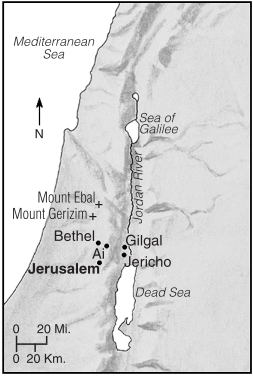Open Bible Data Home About News OET Key
A B C D E F G H I J K L M N O P Q R S T U V W XY Z
Tyndale Open Bible Dictionary
Intro ← Index → ©
AI
Canaanite city that was settled before the time of Abraham (Gn 12:8; 13:3). The name suggests a “ruin” of special significance or striking appearance. The inhabitants of Ai, as well as those of other Canaanite cities (Shechem, Bethel, Jerusalem), did not hinder Abraham in his meanderings in the hill country throughout the land. Abraham may have met with representatives of those cities and convinced their kings of his peaceful intentions. Or he may have presented such a strong front with his sizable entourage that he forestalled any Canaanite move against him.
The people of Israel, led by Joshua, entered Canaan, the Promised Land, with the intention of ridding it of its former occupants and claiming it as their inheritance. Ai, the second city to face them, withstood the first Israelite attack against it. After dealing with Achan, a disobedient soldier whose taking of booty from Jericho had caused their defeat, the Israelites attacked Ai a second time and defeated it (Jos 7:1–8:29). Joshua captured the king, executed him, and burned the city, leaving it a heap of ruins (Jos 10:1).
Ai, rebuilt and reoccupied during the monarchy (under Saul, David, and Solomon), seems to have been known under several names. It was evidently called Ayyah, one of the villages of Ephraim (1 Chr 7:28); Aiath, a village through which Assyrian armies marched toward Jerusalem (Is 10:28); and Aija, a village occupied by Benjamin’s descendants during the exilic period (Neh 11:31).
See also Conquest and Allotment of the Land; Joshua, Book of.

Joshua Conquers Ai
After an unsuccessful first attempt, the Israelites attacked Ai again and were successful. Joshu sent one detachment of soldiers to lie in wait while he led a second group against the city. When the army of Ai attacked, Joshua’s men occupied the enemy while the men lying in ambush moved in and burned the city.
